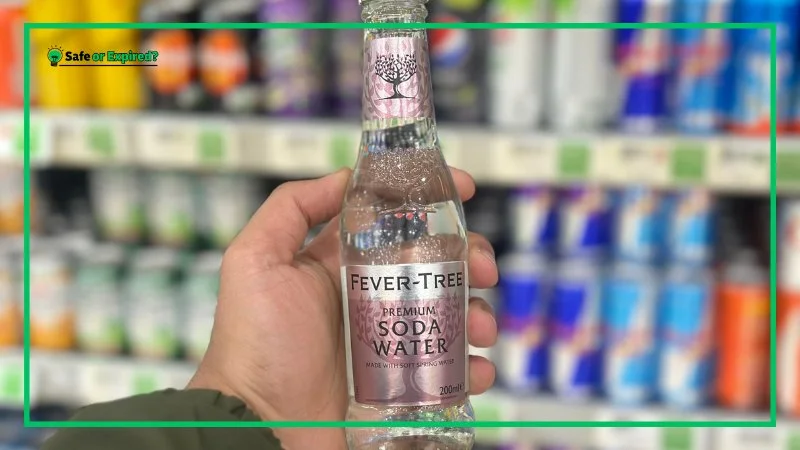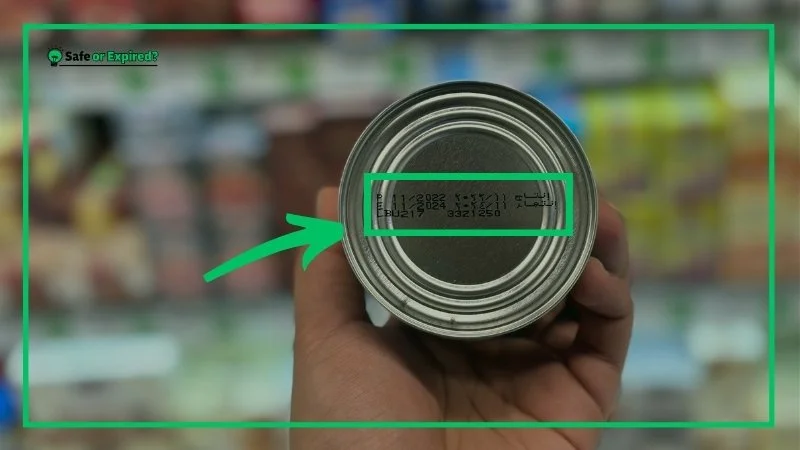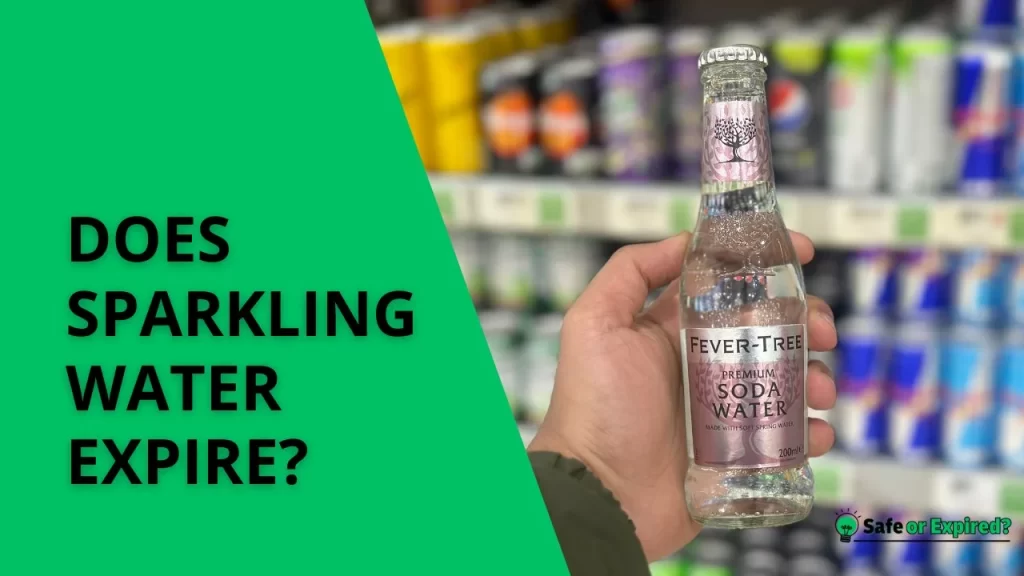“Does sparkling water expire?” is the first thought when we find a forgotten bottle in our pantry or refrigerator. The short answer is yes, but not in the way you might think. Don’t worry; in this enlightening article, you will learn all about its expiry and shelf life. So, grab your favorite glass, and let’s explore the bubbly facts together.
Does Sparkling Water Expire? Understanding the Shelf Life
Sparkling water does expire, but it doesn’t spoil like milk or juice. It has a best-before date that indicates when it might start to lose its sparkle and taste. This date is usually several months to a year from the production date. However, note that the expiration date differs if you open the bottle.
How Long Does Sparkling Water Last Unopened?
Unopened sparkling water can last well beyond its printed expiration date if stored properly. Typically, it remains at its best quality for about 12-18 months when kept in a cool, dark place. The key to its longevity is the airtight seal, which keeps the carbonation intact.

Once this seal is broken, the clock starts ticking on its freshness.
Does Sparkling Water Go Bad After Opening?
Once opened, the lifespan of sparkling water shortens significantly. Technically, it doesn’t spoil in a way that can harm you, but it does lose its fizz and can start to taste flat.
Ideally, you should consume opened sparkling water within a few days, especially if it’s not stored in the fridge. Keeping it cold can slow down the loss of carbonation, preserving its bubbly texture and refreshing taste a bit longer.
Here’s a table about sparkling water expiry to clear things further:
| Storage Condition | Opened Sparkling Water | Unopened Sparkling Water |
| Counter | 2-4 days | 9-12 months |
| Fridge | 3-5 days | 12-18 months |
In short, sparkling water has a best-before date, but it doesn’t ‘expire’ in the traditional sense. The date is more about ensuring optimal taste and carbonation levels than safety. You can see it clearly on the bottom or near the cap of the bottle/can.

What Is the Science Behind Sparkling Water’s Expiry?
The science behind the sparkling water’s expiration is a bit complicated. It mainly involves carbonation, which is the reason why it has a long shelf life. In addition, the protective mantle also plays a role. In most cases, environmental factors also decide the expiry.
The Role of Carbonation
Carbonation is like a superhero for sparkling water. When CO2 gets cozy in water, it creates a slightly acidic environment. You might think, “Acidic? Is that okay?” Absolutely! This level of acidity is like a shield, guarding against unwanted bacteria and keeping your water tasting fresh. However, just like any good superhero story, there’s a twist.
Once you pop open a bottle, the CO2 starts to sneak out, and our hero’s powers begin to wane, taking some of the freshness with it.
Packaging’s Protective Mantle
Modern packaging plays a crucial role in the shelf life of sparkling water. Whether it’s a plastic bottle, a glass bottle, or a can, each packaging type is designed to withstand internal pressure and prevent CO2 from escaping. Glass bottles, and cans are particularly effective at preserving carbonation and, by extension, the water’s taste and quality, for longer periods.
Here’s an example:

Plastic bottles, while convenient and lightweight, may not be as adept at keeping sparkling water carbonated over long periods, especially if exposed to heat or direct sunlight. The permeability of plastic to CO2 gas can lead to faster degassing, impacting the beverage’s shelf life.
Here’s a general table:
| Packaging Type | Before Opening | After Opening (Keep Refrigerated) |
| Glass Bottle | Up to 2 years | 3-5 days |
| Plastic Bottle | 1-1.5 years | 2-4 days |
| Can | Up to 2 years | 3-5 days |
Environmental Factors and Storage
The environment in which sparkling water is stored can significantly affect its expiry. Exposure to high temperatures, sunlight, or ambient temperature fluctuations can accelerate carbonation loss. This is why storing your sparkling water in a cool, dark place can help maintain its quality for longer.
Moreover, how long sparkling water is stored after opening influences its shelf life. Once opened, the carbon dioxide begins to escape, and the water gradually loses its sparkle. Storing opened sparkling water in the refrigerator can slow down this process. However, it’s best enjoyed within a few days for optimal freshness.
Is Sparkling Water Still Safe After Expiration? (Let’s Find Out)
Absolutely, sparkling water remains safe to drink even after the expiration date has passed. The “expiration” date on sparkling water is more accurately described as a “best before” date, which indicates the “deadline” within which the product is expected to maintain its best quality in terms of taste and carbonation.
After this date, while the fizz might diminish, the water itself does not become harmful or unsafe to consume if it has been stored properly and the packaging is intact.
But if your sparkling water looks, smells, or tastes off, it’s best to err on caution and discard it. Changes in appearance or an unusual odor can signal contamination.
That’s all about whether the sparkling water is safe after expiration.
For those of us who love a good energy boost, knowing about the shelf life of drinks like Red Bull is super important. You might be wondering just how long these drinks last. To get the scoop on energy drinks, check out “Does Red Bull Expire? Truth About Its Lifespan Exposed”.
And what about sports drinks like BodyArmor? Whether you’re working out or just need to stay hydrated, these drinks are go-to options for many. If you’re curious about how to keep them tasting great, take a look at “Does BodyArmor Drink Expire? (Best Ways to Ensure Freshness)”.
FAQs
Does Canned Sparkling Water Expire?
Yes, canned sparkling water has a “best by” date to ensure you enjoy its optimal taste and fizz. However, it doesn’t expire in the traditional sense, where it becomes unsafe to drink immediately after this date. The carbonation and sealing process of cans can preserve the water well beyond this period, though the quality may decline over time.
Does Flavored Sparkling Water Expire?
Flavored sparkling water also has a “best by” date, similar to its unflavored counterparts. Adding flavors and sweeteners might slightly alter how well the drink holds up over time. While it remains safe to consume past this date, the flavor intensity and carbonation might diminish, affecting the overall drinking experience.
Does Sparkling Water Go Bad if Not Refrigerated?
Sparkling water doesn’t necessarily go bad if not refrigerated, especially if it’s unopened. However, keeping it cool and away from direct sunlight can help maintain its carbonation and flavor quality for longer. Once opened, it’s best to refrigerate it to preserve its fizz and freshness, consuming it within a few days for the best taste.
How Long Does Canned Sparkling Water Last?
Unopened canned sparkling water can last well beyond its “best by” date, often maintaining good quality for 6 to 9 months past this point if stored properly in a cool, dark place. Once opened, the sparkling water should ideally be consumed within 2 to 4 days, especially if it’s not refrigerated, to enjoy its best carbonation and flavor.
Conclusion
In the sparkling debate over whether sparkling water expires, I discussed a lot of things. Here’s the summary:
- Sparkling water comes with a best-before date, not an expiration date, indicating optimal taste rather than safety.
- It remains safe to drink past this date, though it may lose some of its zesty carbonation.
- Proper storage practices are crucial if you don’t want the sparkling water to get spoiled quickly.
Remember that sparkling water’s crisp, refreshing taste can be enjoyed to the last drop with a little knowledge and proper care. Cheers to staying hydrated with your favorite bubbly beverage!

